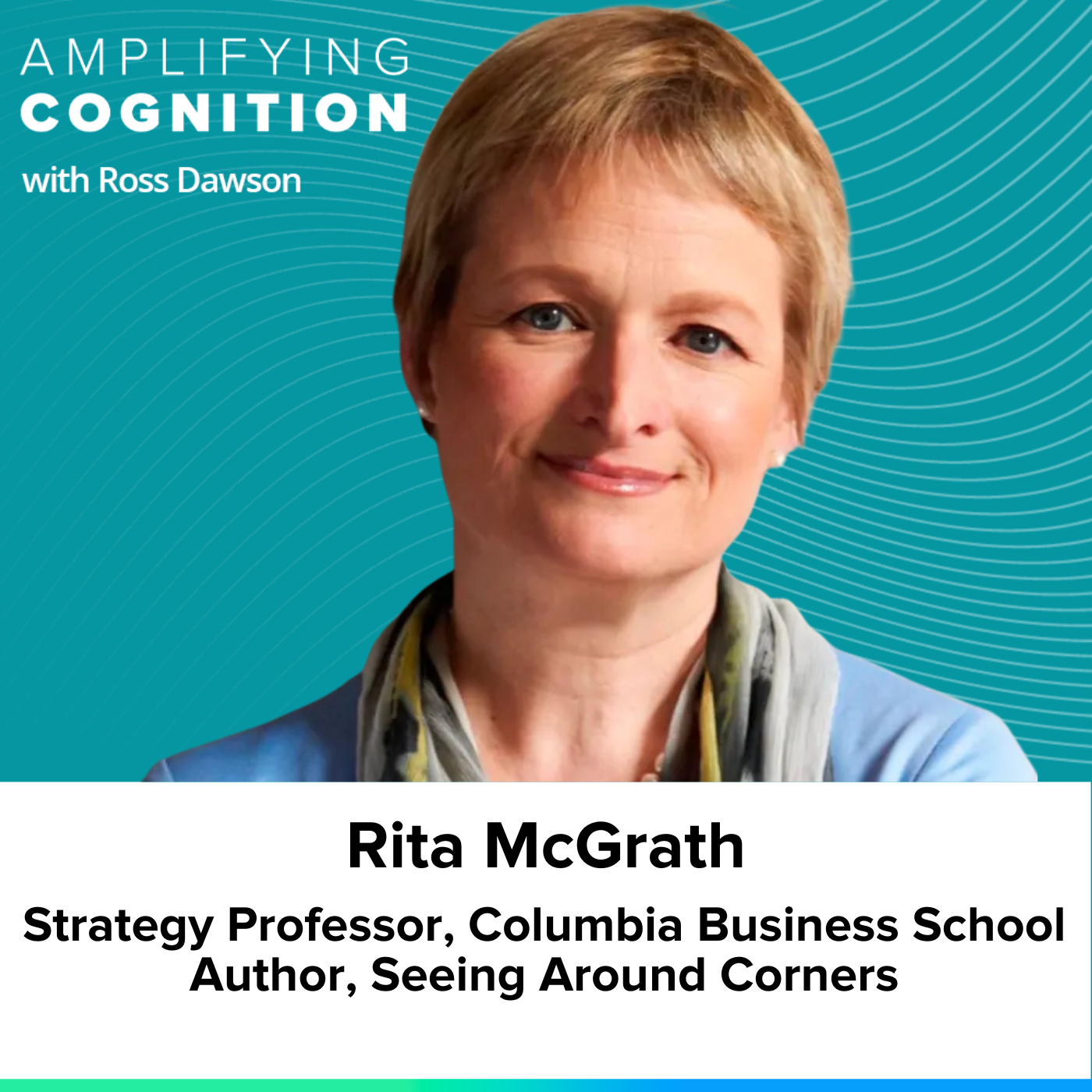“What I argue is you need to supplement what your brain can manage on its own. And this is where I think AI comes in… blending the human imagination together with AI’s ability to crunch massive amounts of data—that’s where I think we’re going to see a lot of power in the world of strategy.”
– Rita McGrath

About Rita McGrath
Rita McGrath is one of the world’s top experts on strategy and innovation. She is consistently ranked among the top 10 management thinkers globally and has earned the #1 award for strategy by Thinkers 50. She is Professor of Strategy at Columbia Business School, and Founder of the Rita McGrath Group and Valize LLC. Her books include The End of Competitive Advantage and Seeing Around Corners.
What you will learn
- Navigating the acceleration of business and strategy
- Understanding inflection points and their impact on industries
- How AI enhances human decision-making and sense-making
- Why competitive advantages are becoming more transient
- The surprising link between digital habits and declining gum sales
- The future of consulting and professional services in an AI-driven world
- How leaders can prepare for the evolving nature of work
Episode Resources
People
Companies & Organizations
Books
Technical Terms & Concepts
- Transient advantage
- Disruptive technology
- Inflection points
- Digitalization
- Dematerialization
- Sense-making
- Strategic thinking
- Gig economy
- Circular economy
- Automation
- Competitive advantage
Transcript
Ross Dawson: Rita, it is fantastic to have you on the show.
Rita McGrath: Thank you very much for inviting me.
Ross: So my personal experience is that, over time, the world has come towards me, and what I’ve been thinking has become more and more of a reality. That strikes me very much with your work. I think you’ve been incredibly prescient. A lot of the themes you’ve worked on for years are even more relevant today than they were earlier. Has that been your feeling?
Rita: It has. It has. I mean, I was writing about what we would now recognize as the lean startup movement back in the ’90s. Clayton Christensen and I were working together on his idea of disruptive technology. My book The End of Competitive Advantage, which basically argued that competitive advantages last for shorter and shorter periods of time, came out in 2013, and people are still saying, “Wow, that’s so interesting.” So it is that kind of feeling.
Ross: In particular, you’ve talked about transient advantage. A very long time ago, that advantage has become more and more transient, which we can frame as acceleration. And I think that there used to be a bit of debate—is the world accelerating, or is it just a feeling that it’s accelerating? So what’s your perception today in terms of where we might move forward, especially regarding the pace of change in business, strategy, and competitive advantage? Is this acceleration likely to continue?
Rita: Yes. To quote Ray Kurzweil, any system that embeds experience-based learning—trial and error learning—tends to follow an exponential change pattern. It’s not additional, it’s not linear—it’s exponential. And we, as human beings, experience that as things moving faster and faster.
So, day one, it’s two. Day two, it’s four. Day three, it’s eight. Eventually, these exponential curves take off, and I think we’re seeing quite a bit of that with the current developments in AI at the moment.
Ross: You’ve pointed to this theme of inflection points. How would you frame some of the current developments in AI or its impact on business around that theme? Are we living through an inflection point or a phase—or a series of them at the moment?
Rita: Yeah, I believe we are. And I would say that there are multiple levels of inflection points.
At a 30,000-foot level, if you think about the financial and social structures of capitalist systems, they go through these 50- to 70-year cycles each time a new technology emerges that dramatically changes our ability to do something.
Going all the way back to the 1700s and the original Industrial Revolution, what you see happening is what I define as an inflection point—something that creates a 10x shift in what’s possible. In the Industrial Revolution, labor was automated. Then we had the mass production era—cars, suburbs, petroleum-based economies—that has been coming to the end of its S curve of delivering prosperity and productivity.
The next wave is really this era of digitalization, which I would date to the early ’70s, with the microprocessor and the earliest digital technologies. What digitalization does is change what’s possible by a factor of 10. Some of the effects are quite surprising.
For example, one of them is dematerialization—taking things that used to require their own physical device or material and digitizing them. Songs are a great example.
Back in the day, you had to buy records, have a record player, and all the associated technology. Later, it was CDs, where you had to pay for 18 songs when you just wanted one. Today, we don’t even buy songs anymore—we stream them on demand on a device that doesn’t require physical input. It’s all digital.
Ross: One of the key themes is strategy. How do we do strategy in a world where acceleration is happening, where there are all these overlaying themes, and these 10x shifts across different dimensions of work?
This brings us to human capabilities. Humans have finite cognition, even though we have extraordinary capabilities far beyond anything else. And now, we have AI to augment, support, or complement us. I’d like to dive deeper into this, but to start, how do you frame human capabilities in strategic thinking today, and how are they complemented by AI?
Rita: Sure. Well, I think, as I mentioned, human brains think in linear terms. We think immediately in terms of, I have to get from here to there to avoid a predator, and back when we were evolving, that worked pretty well.
But we don’t handle exponential systems well because they appear small and insignificant—until suddenly they don’t. It’s this whole gradually, then suddenly idea.
What I argue is that we need to supplement what our brains can manage on their own, and this is where AI comes in.
What I’ve set up with companies is a series of what I call time zero events—signals that indicate a future inflection point is approaching. We don’t know exactly when, but then we work backward and ask, Before that happens, what conditions need to be in place?
AI makes the process of sensing signals much faster and more efficient. It supplements our brains by sorting through massive amounts of data, identifying patterns, and alerting us to relevant developments.
AI isn’t very good at imagination—it’s better at hallucinations than true creativity right now. But by blending human imagination with AI’s ability to process vast amounts of data, we can create powerful tools for strategy.
Ross: That’s fabulous. Rita, it’s fantastic to see the body of your work. And I think not just the open-mindedness, but also the questions you’ve asked, have anticipated the world we’re living in today. Your work is extraordinarily relevant.
So where can people go to find out more about your work?
Rita: Well, ritamcgrath.com is a good place to start. That’s my personal website, where you can find all kinds of information, downloadable articles, and so forth.
I also publish regularly on LinkedIn, Medium, and Substack, so you can find me in those places.
And for those who might be interested in more of an advisory touch, I have a sister company called Valize—that’s V-A-L-I-Z-E—that is figuring out what this new model for consulting is going to look like. I’m not sure we have the answer yet, but we’re certainly happy to go on the journey to figure it out.
Ross: Fantastic. Thank you so much for your time and insights, Rita.
Rita: Thanks.
Podcast: Play in new window | Download






